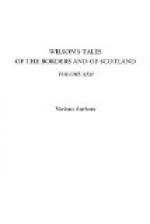“Know, ye who for your pleasures
gape,
Man’s life at best is but a scrape.”
But the entry of his daughter brought the old man back to the margin of real living existences. He held out his hand to her, and smiled in the face that was dear to him, as if for a moment he rejoiced in the experience of a feeling which connected him with breathing flesh and blood. The object of her visit was soon explained. Whispering in his ear, as if she were afraid of the sound of her own words, she told him that Walter had promised her a love-token, and that she wished to give him one in return, for which purpose she desired that she might be permitted to use one or two old “Spanish ounces” that lay in the old bureau.
“Yes, yes, dear child,” said he. “Get a golden heart made of them. It will be an emblem of the true heart you have to give him, and a pledge to boot.” Then, falling into one of his reveries, in which his mind seemed occupied by some strong feeling—“I am thus reminded,” he continued, “of the old song you used to sing. There is a verse which I hope will never be applicable to you as it was to me. I wish to hear it for the last time,” he added, with a languid smile, “in consideration of the ounces.”
Rachel knew the verse, because she had formerly noticed that it moved some chord in his memory connected with an old love affair in which his heart had been scathed; but she hesitated, for the meaning it conveyed was dowie and ominous.
“Come, come,” said he, “the fate will never be yours.”
She complied, yet it was with a trembling voice. The tune is at best but a sweet wail, and there was a misgiving of the heart which imparted the thrilling effect of a gipsy’s farewell—
“If
I had wist ere I had kisst,
That true
love was so ill to win,
I’d have lock’d my heart in
some secret part,
And bound
it with a silver pin.”
“Now you may take the ounces,” said he with a sigh. “The verse has more meaning to me than you wot off, and surely, I hope, less to you.”
And having thus gratified his whim—if that could be called a whim which was a desire to have repeated to him a sentiment once to him, as he hinted, a reality connected with the young heart when it was lusty, and his pulse strong and thick with the blood of young life—– she went to the bureau, and, taking three of the ounces, she left the room. In the gloaming, she was again on her way to Paul’s workshop, where she found the artist, as usual, with his head bent over the bright desk on the bench, engaged in some of his fanciful creations. Having seated herself in the chair where she had so often sat, she commenced her story of the circumstances of the day,—how Walter Grierson had acted and spoken to her; how he had accounted for the locket and inscription; how he intended to change the latter, and substitute her name for that of Agnes Ainslie; how he had sought her love,




